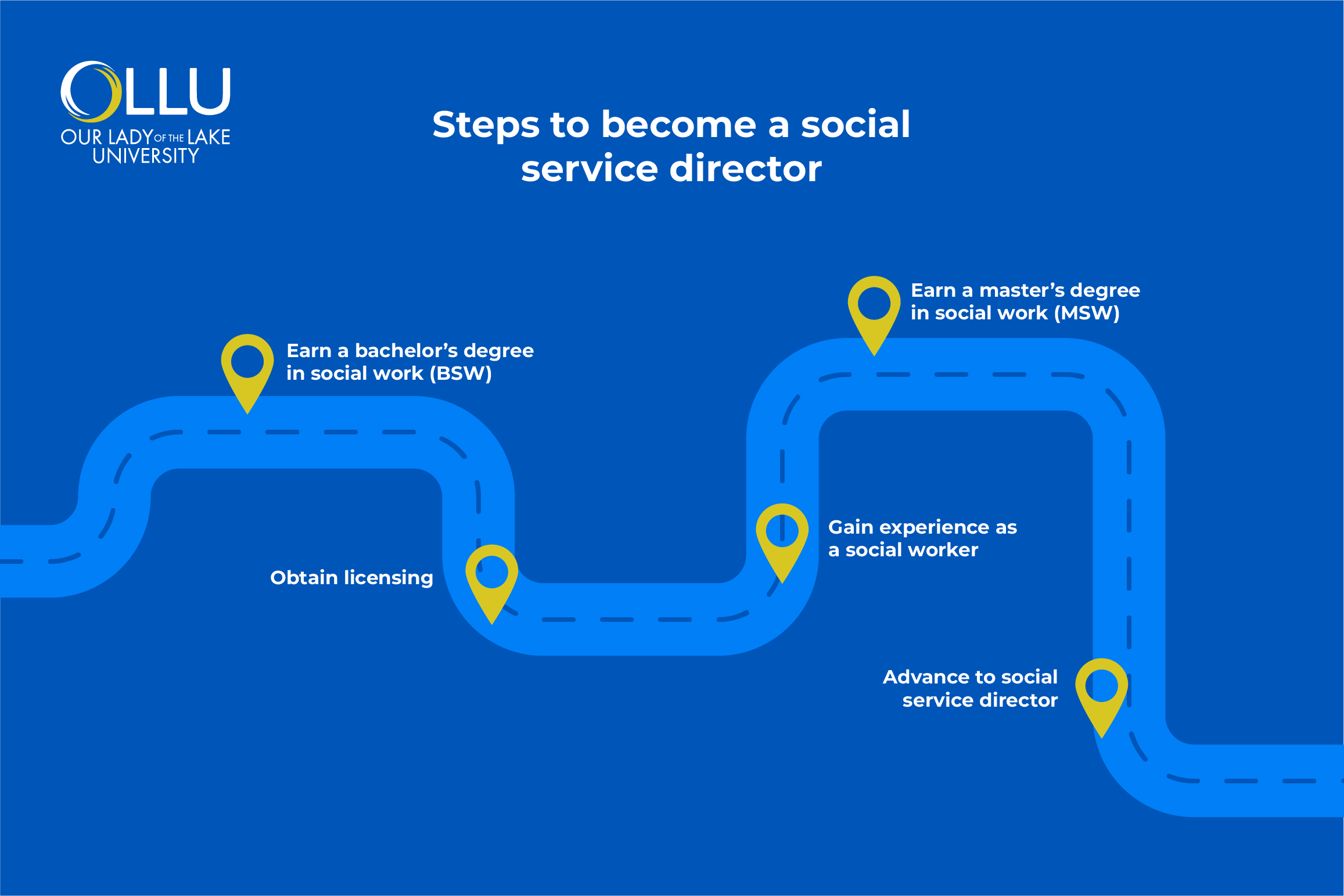What Is a Social Service Director? Everything You Should Know
Jan 08, 2025

Key Takeaways
- Social service directors play a crucial role in setting goals, creating policies, securing funding, managing staff, and ensuring that social service programs operate smoothly.
- To become a social service director, you must first earn a degree in social work, gain experience in the field, obtain necessary certifications and licensure, and develop leadership skills.
- Social service directors typically earn an average salary of $67,128 per year, with the potential to earn more depending on experience, certifications, and location.
For many, the true value of their work is measured not by personal gain but by how much it benefits society as a whole. The greatest inventions and breakthroughs throughout history—such as the wheel, electricity, or the internet—are revered not because they solved individual problems but because they advanced humanity and improved our way of life.
This idea of contributing to the greater good resonates in fields like social work. In roles such as social service director, the core mission is to uplift and support individuals in need. These professionals are dedicated to guiding their teams toward creating meaningful change and ultimately strengthening society.
What Is a Social Service Director?
Before we answer the question, "What is a social service director?" it's important to break down the two key components of this role: social service and director.
Social service is a broad term that refers to the range of services designed to assist individuals and communities facing difficulties. They're focused on improving the quality of life for vulnerable populations, addressing issues such as poverty, homelessness, mental health problems, addiction, child welfare, and more.
When we add the role of director, it refers to the person responsible for overseeing the operation and management of these services. A social service director is tasked with ensuring that services are delivered efficiently and effectively to meet the needs of the community. They play a crucial role in setting goals, creating policies, securing funding, managing staff, and ensuring that social service programs operate smoothly.
What Does a Social Service Director Do?
A social service director is responsible for managing the operations and administration of social service programs. Their duties include:
- Overseeing a team of social workers and support staff
- Designing and implementing new social service initiatives
- Allocating resources and ensuring the financial stability of social service programs
- Making sure all programs adhere to legal and ethical guidelines and regulations
- Monitoring and assessing the effectiveness of social service programs and making improvements as needed
- Working with local government bodies, nonprofits, and other organizations to coordinate services
- Securing funding and resources to support social service programs
- Setting goals and motivating staff to achieve high-quality service delivery
Essential Skills and Qualities of a Successful Social Service Director
To succeed as a social service director, a combination of technical knowledge and non-technical abilities is needed. Some such skills and qualities include:
- Ability to design, implement, and oversee social service programs
- Knowledge of managing budgets and financial resources to ensure programs are adequately funded
- Proficiency in evaluating program outcomes using data and statistics to assess effectiveness
- Understanding of laws and regulations related to social services
- Knowledge of risk factors and protocols for ensuring the safety of both clients and staff
- Skills in developing and implementing policies
- Familiarity with software tools used for case tracking, reporting, and communication
- Strong leadership skills
- Excellent verbal and written communication skills
- Empathy
- Strong critical thinking and problem-solving skills
- Ability to mediate disputes and manage conflicts between clients, staff, or external partners
- Strong organizational skills
- Ability to adjust to changing circumstances and new challenges
- Collaborative mindset to work with others in a team-oriented environment
- Ability to understand others' emotions and manage one's own
How To Become A Social Service Director

To become a social service director, you first need to meet the requirements for a social worker and then gain additional qualifications and experience to step into the director role.
Educational requirements
The first step to becoming a social service director is usually earning a bachelor's degree in social work (BSW) or a related field, such as psychology or sociology. Many social service directors also hold a master's degree in social work (MSW), which is often preferred by employers and can provide additional opportunities for advancement.
During your degree program, you will likely gain field experience, such as internships or practicum placements, which provide you with real-world exposure to social service work.
However, obtaining a degree alone is not enough to become a social service director. It's common for professionals to first become social workers or aim for similar roles and then move up into management or directorial positions over time as they gain experience and develop their leadership skills.
Certification and licensing
Licensing is required for all social workers in the United States. The requirements vary by state, but generally, you must pass an exam and complete a certain number of supervised hours. Licensing ensures that social service professionals meet the legal and ethical standards required to provide services to clients.
The Licensed Bachelor's Social Worker (LBSW) and Licensed Master's Social Worker (LMSW) can be highly relevant and beneficial for aspiring social service directors. An LBSW license allows social workers to practice in a variety of settings and with a broad range of clients, while an LMSW, which requires an MSW degree, provides the ability to perform more advanced clinical duties and manage cases that require specialized expertise.
In addition to that, some certification options worth looking into for specialized work include:
- Certified Social Work Case Manager (C-SWCM)
- Certified Advanced Social Work Case Manager (C-ASWCM)
- Certified School Social Work Specialist (C-SSWS)
- Certified Children, Youth, and Family Social Worker (C-CYFSW)
- Certified Clinical Alcohol, Tobacco, and Other Drugs Social Worker (C-CATODSW)
- Certified Social Worker in Health Care (C-SWHC)
Salary And Job Outlook For Social Service Directors
The salary potential for social service directors can vary based on location, experience, education level, and the type of organization they work for. On average, social service directors earn approximately $67,128 per year. However, salaries can range from as low as $33,000 to as high as $113,500 annually, depending on those variables.
Directors with more experience, specialized certifications, and leadership skills tend to be on the higher end of the salary scale, especially those working in larger organizations or urban areas with a higher cost of living.
As for the job outlook, employment of social and community service managers, including social service directors, is projected to grow by 8% from 2023 to 2033. They can be employed in a variety of settings, such as nonprofit organizations, government agencies, healthcare facilities, schools and educational institutions as well as private companies and corporations.
Is A Career As A Social Service Director The Right Fit For You?
With a positive job outlook and the potential for competitive salaries, a career as a social service director offers rewarding opportunities to make a significant impact on the lives of individuals and communities. So, from an objective standpoint, it's an excellent opportunity for anyone interested in social services, leadership, and community betterment.
However, when it comes to deciding if this career is the right fit for you, it's important to consider more than just the external rewards—it's a highly personal decision. A career in social service leadership requires a deep commitment to helping others, managing complex programs, and handling the demands of a fast-paced environment.
To help you make a decision, think about your answers to questions such as:
- Are you driven by a desire to help people and make a tangible difference in your community?
- Do you enjoy managing teams and coordinating complex projects while balancing multiple responsibilities?
- Are you able to navigate the emotional challenges of working with individuals who may be experiencing crisis or difficult circumstances?
- Does the idea of growing into a directorial role align with your personal ambitions and professional aspirations?
- Are you ready for the level of commitment and time management required by a leadership role in social services?
The Bottom Line
A career in social service, and specifically as a social service director, will provide you with the deep fulfillment that only comes from knowing your work truly has a lasting, positive impact on people's lives. Every decision you make, every program you implement, and every team you lead is grounded in the intent to help others.
But before you can start helping others, let us help you! Join our Bachelor of Social Work degree and learn from experienced faculty, gain valuable hands-on experience, and be prepared for social service leadership. Let's build a better future together—starting with you.
Frequently Asked Questions (FAQs)
What is the difference between a social service director and a social worker?
A social service director oversees and manages social programs, while a social worker directly provides support and services to individuals and families in need.
How long does it take to become a social service director?
Becoming a social service director typically requires a bachelor's degree, several years of experience in social work or management, and often a master's degree, which can take anywhere from 5 to 10 years, depending on your path.